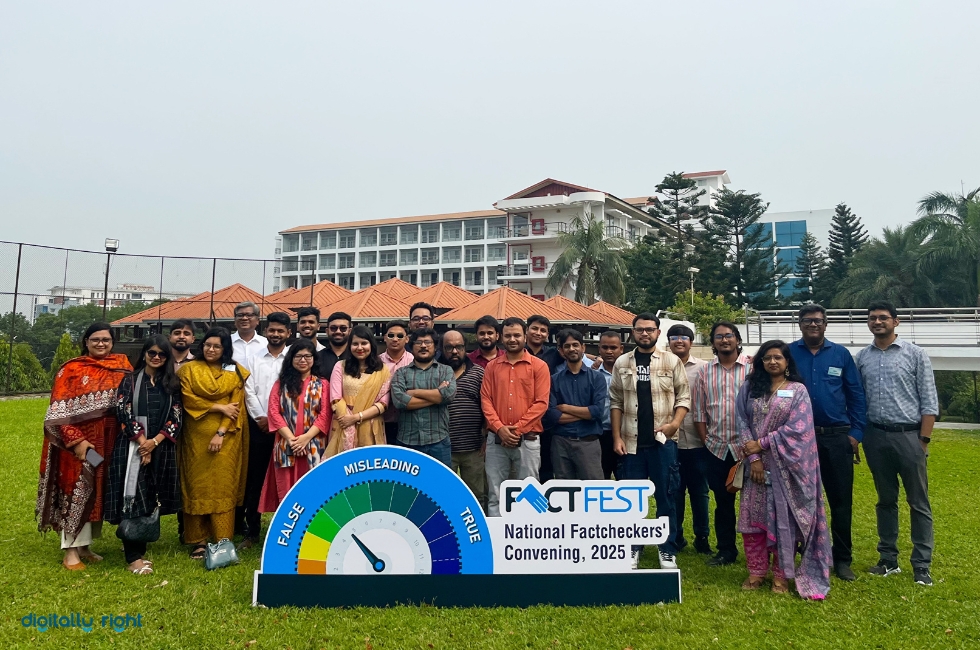Be it rumor, misinformation, or disinformation, the spread of harmful narratives is a global challenge. But in countries like Bangladesh, the stakes are even higher. With a growing dependence on social media as a prime source of information and low levels of media literacy, the ecosystem is particularly vulnerable. Factchecking initiatives are still limited, and traditional media outlets often fall short in their gatekeeping role, sometimes publishing news without thorough verification, leading to undermining public trust.
In this context, Digitally Right, in collaboration with The Asia Foundation and UK International Development, hosted the FactFest: National Factcheckers’ Convening 2025. The event brought together factcheckers from leading factchecking organizations and media outlets in order to address the issues regarding the information ecosystem and factcheckers’ role, making it the very first initiative of its kind in Bangladesh.
In the two-day event on April 20 and 21, 24 factcheckers from six organizations in the country came together representing AFP Factcheck, Boom Bangladesh, Dismislab, Rumor Scanner, FactWatch and Ajker Patrika.
Strengthening collaboration among factcheckers, sharing experience-based insights, building collaborative strategies to respond to several types of false information, and collectively addressing the challenges posed by disinformation in Bangladesh: these were the primary aims of the convening.
The first day of the event featured two critical panel discussions. The opening panel, themed “Fact-Checking, Trust, and the Road Ahead” attempted to evaluate the current information ecosystem, assess the state of fact-checking practices in Bangladesh, and identify the upcoming challenges and potential solutions. The second panel, “Rethinking our Response to Gendered Disinformation,” focused on existing and better approaches to addressing gender-based false information and Artificial Intelligence (AI) generated content.
In addition to the panel discussions, fact-checkers representing their respective organizations showcased some of their most impactful work and the challenges they faced throughout the process while others suggested their possible solutions.
The day concluded with a workshop titled “Strategies for Monitoring Misinformation and Disinformation Online,” which focused on practical tools and approaches for identifying and tracking false content across digital platforms.
The second day of the convening commenced with a focused group discussion on “Collaborative Strategies for Tackling Disinformation in the Upcoming Election.” Against the backdrop of a rapidly evolving political landscape, the forthcoming election is anticipated to be one of the most pivotal and transitional moments in the country’s recent history.
Reflecting on the 12th National Parliamentary Elections held on January 7, 2024, panelists highlighted the widespread circulation of various forms of disinformation—from fabricated candidate withdrawal announcements to misleading reports about international endorsements or condemnations. That election was marked by lowest voter engagement in recent decades. In contrast, the factcheckers emphasized, with more stakeholders involved, the upcoming election is expected to be significantly more participatory, drawing greater public interest. In light of these developments, combating misinformation in the upcoming election will be even more complex.
The discussion delved into key challenges, potential threats, and the importance of collaborative, multi-stakeholder strategies to safeguard the integrity of the electoral information environment.
The two-day convening concluded with a comprehensive SWOT analysis session titled “Tackling Disinformation: Mapping Needs, Gaps, and Strategies.” The discussion highlighted key strengths and opportunities within the existing fact-checking ecosystem, while also identifying critical gaps and vulnerabilities that hinder collaborative and effective responses to disinformation.
While FactFest: National Factcheckers’ Convening 2025 may have been the first initiative of its kind in Bangladesh, it certainly should not be the last. The event set an important precedent for cross-organizational collaboration, strategic dialogue, and collective reflection on the evolving disinformation landscape. As misinformation continues to adapt and intensify—particularly in high-stakes contexts like national elections, protests, conflicts, natural disasters—ongoing engagement, resource-sharing, and capacity-building among fact-checkers will be mandatory.
We believe the convening served as a critical starting point, laying the groundwork for a more cohesive, evolving, and trustworthy information ecosystem in Bangladesh. The participants voiced a shared hope, an aspiration to keep this momentum going, encouraging more initiatives, strong collaboration, and effective networks to combat false information.

